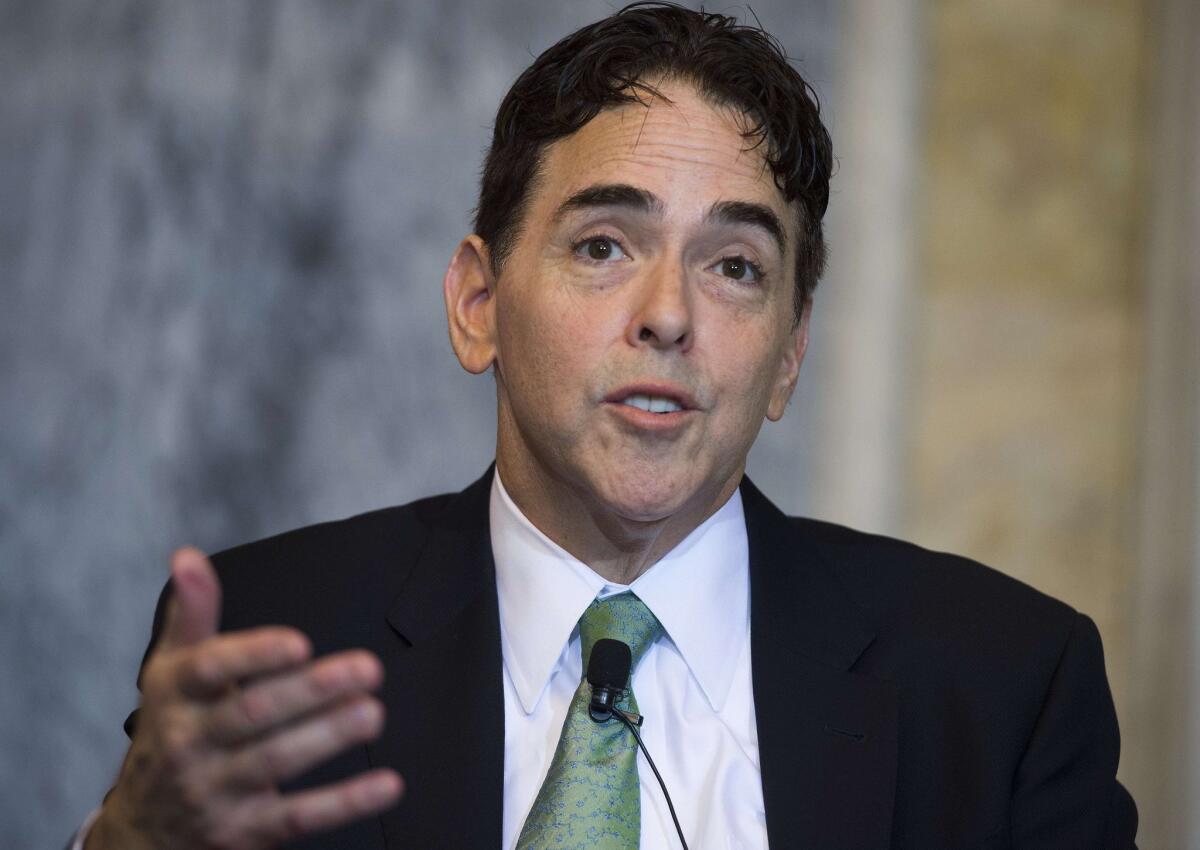Prepaid debit card pioneer Steve Streit out as CEO of Green Dot

Consumer finance pioneer Steve Streit, a former disc jockey who put prepaid debit cards in the wallets of millions of Americans, is retiring as chief executive of Green Dot, which has seen its stock plummet this year amid an onslaught of competition from a new generation of financial technology companies.
Streit, 57, will also retire from the board of the Pasadena firm’s holding company and as chairman of Green Dot Bank effective Dec. 31. He will transition to the role of chief innovation officer as an independent advisor. Also retiring as part of the management shake-up is Chief Financial Officer Mark Shifke. Green Dot board Chairman William Jacobs will serve as interim CEO pending the appointment of a replacement.
Streit, in a statement issued by Green Dot, said that October marked his 20th anniversary at the firm he founded in 1999 and was “the benchmark for when I promised myself and my family that I would retire from my role as Green Dot’s CEO.” He said a search for a successor had begun this year and that the recruitment process should be “even more productive with my retirement public.”
Whoever is appointed chief executive will be walking into a challenging environment.
Green Dot’s core business is selling prepaid debit cards, which can be loaded at stores by customers who may not have a traditional banking relationship. They are available at more than 100,000 retailers nationwide, including Walmart, which also sells a card issued by Green Dot that is branded as the retailer’s own popular Walmart MoneyCard.
Streit survived an effort in 2016 by San Francisco hedge fund Harvest Capital to oust him, saying the company was underperforming. The fund got members on the board and Green Dot’s revenue and profits rose. This year, however, profits are down.
The company lost $530,000 on operating revenue of $240 million in the quarter that ended Sept. 30, after making a profit of $4.6 million on operating revenue of $231 million in the same period a year earlier. Also, profits have fallen this year for two successive quarters after hitting $64 million in the first quarter. That has taken a toll on the stock, which has fallen 72%, from a high of $84 in January to $23.18 at the close of the market on Thursday, when it fell 10.4% on the news of Streit’s departure.
“It’s been an interesting ride,” said Joseph Vafi, an analyst at Canaccord Genuity, who traced many of Green Dot’s sudden problems to a tidal wave of competition from a “ton of new upstart online virtual banks” that have swept up potential customers.
They include Chime, a San Francisco digital bank built around a mobile app that doesn’t charge monthly fees and offers overdraft protection up to $100 without fees. Another prominent competitor is Square, a mobile payments company founded by Twitter co-founder Jack Dorsey.
In response to the competition, Green Dot this summer introduced its Unlimited Cash Back Bank Account, which offers 3% cash back for online and mobile purchases, no overdraft fees and 3% interest on savings.
“The Green Dot products are really quite competitive. You can’t really fault Steve. If you want to fault him for anything, he was thinking that the Square customer wasn’t his a couple of quarters ago, but it turns out they are,” said Vafi, who added that the competition has decreased potential new customers while also increasing Green Dot’s churn rate, forcing it to boost spending on marketing.
Green Dot has had success selling its financial technology services to other businesses, he said. That includes Uber, which issues an Uber Visa debit card to its drivers for payment, and Turbo Tax, which provides refunds through a Green Dot-issued card.
Green Dot also handles the cash portion on Apple Pay accounts, including cash transfers and payments. Vafi said he expects the company may choose a successor who can help grow the enterprise end of the business.
Streit started his career as a disc jockey — billed as “Streiter the Heater” and the “Ayatollah of Rock ‘n’ Rolla,” — and was a radio programming executive when he was laid off in 1999 with a golden parachute.
He used his nest egg to found the company under the name Next Estate Communications, thinking teenagers would use the card to make safe online purchases. But when Rite Aid and CVS pharmacy stores sold the first Green Dot cards in 2002, it turned out that his customers were credit-challenged adults.
The company took off from there and went public in a successful July 2010 initial public offering that saw the company valued at $1.8 billion after its first day of trading.
Since then, the company has fended off many challengers in the space, and over the last few years has built up its business with employers, who directly deposit employee paychecks into Green Dot-issued cards. It also offers mobile banking services through the Apple and Android app stores.
More to Read
Inside the business of entertainment
The Wide Shot brings you news, analysis and insights on everything from streaming wars to production — and what it all means for the future.
You may occasionally receive promotional content from the Los Angeles Times.











